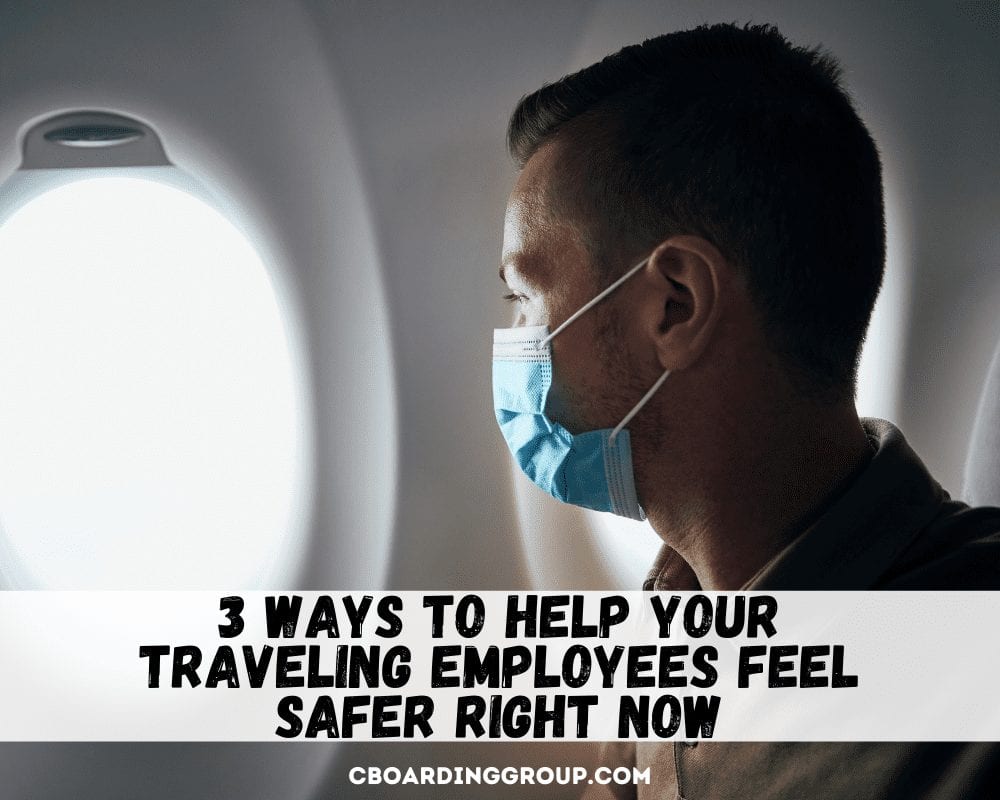Is your company thinking of getting your employees back on the road again? Here are 3 practical ways to help your traveling employees feel safer right now.
The pandemic has devastated the travel industry and while travel numbers are marching slowly upwards again, there is a huge segment of the travel industry that simply hasn’t returned to its pre-COVID levels yet: business travel. Early on these reasons were solely related to employee safety. And while it’s still advisable to avoid travel if you can, it turns out that air travel is much, much safer than expected (especially if you are wearing a face mask).
In spite of the relatively low chances of contracting COVID while traveling (or dying from it) business travel has not returned in any meaningful fashion yet. Some companies are starting to travel again – a little bit (including mine), but for the most part, business travel is still in the midst of an existential crisis which has translated into a full-blown economic crisis for travel providers.

We have Zoom (and other technologies like Microsoft Teams) to thank for some of this as companies have realized that many jobs can be done quite effectively in an entirely remote/virtual environment. Zoom is life, right? Indeed, many of us are now working from home and some companies are making this a permanent fixture. No serious prognosticator, however, believes that business travel is dead, although many suggest (rightfully so, in our opinion) that it will be smaller – at least for the next few years.
- You might be interested in 25 Home Office Gifts for People Working from Home
For those companies that already have a few employees on the road or for those contemplating a ramp-up of business travel what do your employees need to be successful and safe on the road?
Having traveled a few times for work (and pleasure) during the crisis I can tell you firsthand it’s a little different than before. Employees will encounter scenarios and situations that are different than they might be accustomed to. Your staff may have varying levels of comfort or risk appetites with the prospect of business travel. They may have different home situations. Customers may be all over the place too.
- You might be interested in: I’ve now traveled for work twice…and didn’t get COVID. I thought travel was unsafe, right?
If you want your staff to feel safer while traveling you need to have a strategy. Here are 3 ways companies can help employees feel safer when traveling right now:
- Give them a penalty-free & reward-free way out
- Have a pandemic specific policy
- Communicate. Communicate. Communicate
Let’s explain what we mean.
P.S. As a bonus, we’ve also added some additional things for companies to consider when starting business travel back up again (make sure to read all the way to the end for these great tips!)
Give them a penalty-free & reward-free way out
Each employee is likely facing a different home or life situation right now. Employees likely have varying risk appetites. Some employees will have high risk loved ones at home. Perhaps the employee themselves has a higher risk of serious complications from COVID. Maybe they just aren’t comfortable with exposing themselves to perceived or actual additional risk. Some staff may be chomping at the bit to get back out on the road. Other’s may be totally comfortable with the perceived or actual risk.

Moreover, with varying levels of lockdown still in effect across the country, it’s entirely possible that your employee may be facing a unique schooling situation. Maybe their spouse has to go into the office still leaving your employee at home to coordinate remote learning. The prospect of traveling might create an undue financial burden or stress for the employee and their family.
This unusual set of circumstances requires some thoughtful consideration on the employer’s part. A one-size-fits-all approach might not work. It’s a time for empathy, understanding, and flexibility.
If you are going to get your folks on the road again try to avoid situations where employees might feel shamed (or have their career harmed) for politely declining to make that sales trip or site visit. Consider giving them a penalty-free way out and avoiding situations where you unduly reward an employee who is traveling.
Don’t be afraid to have an honest conversation with your team about this.
I’ve tried this approach with my staff and found it’s worked very well. They’ve appreciated the honest approach and what really makes its work is actually not shaming the employee or harming their career. Meaning, you can’t consciously or subconsciously file a note away in the back of your brain, “Oh, Sally wasn’t comfortable making the trip. Noted.” Or “Tim still managed to crush it, putting himself at risk. What a hero.” Nope, that won’t work. Either you are penalty-free or your not.

There are some situations where giving employees a way out may not make sense in the medium or long term. For example, if the position itself is a traveling field engineer position where physically installing “stuff” at a customer’s site is the job and the employee is a high-risk employee it might be time to think about transitioning that employee into a different role – even if just temporarily. Always consult your local labor laws and work with your human resources department here. Unfortunately, we live in a litigious world, and while empathy and consideration are more important than ever today, companies still have to comply with regulations.
Have a pandemic specific travel policy
Having now traveled for work a few times during the pandemic I found that there were several situations that a company policy could have made the situation simpler. For example, here are a few scenarios that might pop up while traveling during the pandemic:
- My company policy says I should share a rental car with fellow employees whenever possible. Does that still apply?
- Are we shaking hands now? Fist bumps? A polite wave? What’s the proper way to greet a fellow colleague, employee or superior while on a trip?
- What’s the mask policy at a customer’s site? Do we follow the customer’s lead? Do we politely mention that we are following our company policy regardless of what the customer says?
- Should we do team meals anymore or is better to do takeout in your hotel room?
- What happens if you get ill while traveling?
- What if I am exposed to someone with COVID while I am traveling? Do I jump back on the plane home? Quarantine on the road for a bit?
- Can they expense a face mask they had to buy for the trip? Maybe the travel-sized hand sanitizer?
It’s a weird time right now. Most companies already had a relatively robust travel policy before the coronavirus. It is probably geared towards a cost-effective mode of travel and it probably doesn’t address some of the concerns we now face as we interact with society. Like shaking hands or wearing masks.

For example, I recently visited two different customers and had wildly different experiences. One customer, took all of our temperatures, asked us a series of questions, required us to wear face masks the duration of the visit, met in a large conference room, was clear that we were not shaking hands, and so on. They had a level of rigor that was far different from the other customer I visited who had a much more casual approach to our visit.
After taking our temperature, they announced that masks were optional but the message was clear: we aren’t wearing masks ‘cuz we think they are stupid. We all took them off (mirroring the customer which is rooted in a sales tactic) and crammed into an elevator. We shook hands and stuffed 10 people into a small conference room for an hour.
I know for a fact that at least one of the employees that were with us was very uncomfortable in having to make a choice to leave their mask on during the meeting when the 8 other men and 1 other woman were not wearing masks. Why did we put her in that position? Would it not have been easier to have a company policy that says, “Masks stay on if you cannot socially distance and in all conference meetings where distancing is not possible.” Then, all of us could have simply said, “Hey, it’s company policy to leave our masks on.” The customer wouldn’t have cared (Hey, it’s policy!). Awkward situation avoided.
- You might be interested in: Where to buy the best face masks for travel
Here’s another example from a different trip. I met a junior employee of mine at a restaurant for dinner. I’d never met this employee in person before and like I’ve done a thousand times when meeting someone I extended my hand to shake his. He reciprocated. I realized mid handshake that we probably shouldn’t have shaken hands and kind of awkwardly flubbed it. Wouldn’t it have been simpler if the company policy was straightforward: we aren’t shaking hands with colleagues right now.

Sure, I could have been a little less of a dolt, but why even take the chance of putting a junior employee in the position of having to decide to not accept my handshake (even if me, as a senior manager was being an idiot here)? If it was policy, he could have said offered that as a reminder and all would have been well. No harm, no foul.
The point is that traveling during a pandemic is different than traveling has ever been. While it’s relatively safe, there is still some risk to consider and a pandemic travel policy would help clarify some of this uniqueness we are all facing. Maybe, the policy temporarily pauses sharing of rental cars. Or cancels the room sharing policy for a time (sadly, yes, some companies still have a hotel room sharing policy which is sheer madness if you ask me, pandemic or not).
Here’s what you need to do: consider your company’s unique business elements and craft a custom pandemic travel policy that clarifies many of these key points.
Your staff will thank you. They will be less uncomfortable. And their effectiveness on the road will be enhanced.
Communicate. Communicate. Communicate.
Our final tip for helping employees feel safer when traveling for work is simple: communicate. Then communicate again. Then do it again, and again.
What’s the old saying? You have to tell people something seven times for it to sync up? Now is the perfect time to communicate with your staff.
This is a two-way street. It starts with listening to your staff and their concerns about business travel. Be intentional about this. What worries them? What do they want to feel safer while traveling? Let them know and see that you are listening. That you care about their well being. Show empathy and concern for them and create an environment where they can share their honest concerns (including anonymously).

Conversely, when your policies and actions are enacted you need to communicate them out. I don’t mean make ’em sign the new travel policy. Sure, maybe that’s important, but communicate your new travel policies and actions. Use your intranet page, send emails, maybe short videos, Q&A sessions, etc.
And be willing to adjust. As local and national travel restrictions ebb and flow be willing to 1) pay attention to these macro and micro changes and 2) willing to change your policies. And then, recommunicate.
Some other ideas to consider
Travel during a pandemic is different. That means the old way of thinking about business travel may not work anymore. Here’s a few other ideas for companies to consider as they start to get employees back on the road again.
- Provide high-quality face mask options for employees (or let them expense them). Why not give employees this perk right now?
- Provide them Travel-sized hand sanitizer. The one thing I didn’t bring enough of on my first business trip in the pandemic was hand sanitizer. Why not let employees expense their purchase of travel-sized hand sanitizer?
- Let employees book separate rental cars instead of sharing with colleagues. This seems obvious, but why introduce the risk of employees sharing a car when they don’t know how well the other employee has been adhering to CDC guidance in their personal lives?
- Require separate hotel rooms (sigh…). Unfortunately, some companies still require employees to share hotel rooms. While this practice has largely gone out of style thanks to “HR issues” some companies still do it (often with more blue-collar business travel professions). COVID is the perfect time to kill this insanity once and for all.
- Let employees use on-airport parking to avoid a shuttle ride. On airport parking is expensive, but with all the money your company is saving by having a reduced travel budget right now, it might be worth letting your employees park at the airport so they can walk from their car to the airport and skip the off-airport parking shuttle. It’s the little things…
What do you think companies could do to help make employees feel safer while traveling for work? Drop us a comment below or tweet us. We’d love to hear your feedback.
- You might be interested in 53 Business Travel Gifts for people who travel for work
Final Thoughts on keeping employees safe while traveling
It may be a few years before business travel returns to “normal” – if ever. While reports of business travel’s demise are greatly exaggerated it’s definitely impacted right now. Even if employees are not traveling for work as much as they did in the past, they will travel again – even if at a diminished level.
For those companies who are thinking of getting their staff on the road again or for those who already have employees traveling use this opportunity to make them feel a little safer. Happy Zooming out there and for those you on the road, good luck (I am jealous!).
Other resources for traveling during a pandemic
- 4 things I took with me on my first trip in the COVID-19 era (and what I should have brought more of)
- I’ve now traveled for work twice…and didn’t get COVID. I thought travel was unsafe, right?
- Do I need to self-quarantine after flying? Here’s what to do after you travel
- I sat next to someone on a plane who was visibly sick but I didn’t get sick – was it the masks?
- I just finished my first business trip since March and I loved every second of it
- How to Disinfect your Cell Phone, Laptop, iPad, Spouse, etc (Travel Tip Tuesday #13)
- Best Travel Thermometers: Find a Top Travel-Sized Thermometer
- 21 Travel Necessities Travelers Pack for every trip
- 9 Travel Safety Tips to help you stay safe on your next trip
- Where to buy face masks for travel

